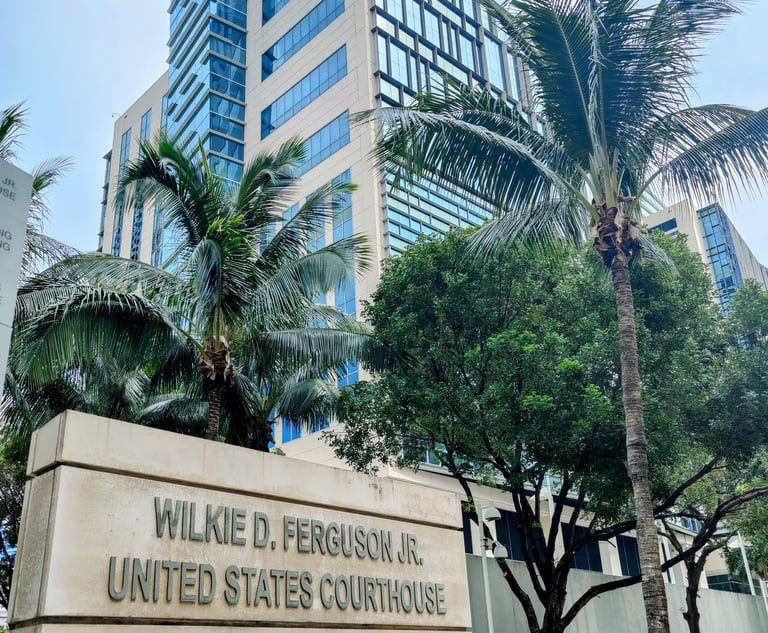 Workers work in the fields in New York state on a hot summer's day. Photo by J.Robert Williams/Shutterstock.com
Workers work in the fields in New York state on a hot summer's day. Photo by J.Robert Williams/Shutterstock.comFarmers Worry Florida Bill Will Worsen Labor Scarcity Woes
Republican Gov. Ron DeSantis has made the E-Verify issue a priority, saying it would remove an incentive for people to come illegally.
February 12, 2020 at 11:53 AM
5 minute read
On a recent afternoon, many stools stood empty beside a conveyor belt where workers examined a stream of green tomatoes and tossed aside those with holes and cracks at a South Florida packing house.
Paul J. DiMare, one of the country's leading producers of fresh tomatoes, recalls the days when hundreds of foreign workers lined up to labor in the fields or box the produce at his facility in Florida City. The machines roared for more than 12 hours a day as truckloads of tomatoes rolled in to be washed, inspected and packaged. Now, they run for only four.
"If you have no labor, you can't run your operation," DiMare says.
The influential farmer and head of DiMare Inc. is among a group of businessmen trying to kill a Florida bill that would require private companies to verify each new hire's eligibility to work in the U.S. through a screening process called E-Verify. DiMare says that could reduce the pool of candidates when his business faces a labor shortage of more than 30%.
"I think illegal immigration is one of the worst things that has happened to this country," he said. "But we don't have a good immigration policy. And what are we going to do to replace those people?"
Republican Gov. Ron DeSantis has made the issue a priority, saying it would remove an incentive for people to come illegally. The state Senate Judicial Committee approved a watered-down version of the proposal Tuesday. It exempts agriculture employers and companies that have fewer than 150 employees, but otherwise requires companies use E-Verify.
Sen. President Bill Galvano has been skeptical about a law that would require all employers to use E-Verify because it would create a burden for employers in Florida's vital agriculture, tourism and construction sectors. Similar measures have failed in the past.
More than 54,000 employers in Florida are currently enrolled in the E-Verify database, federal government records show. That list includes local and state agencies, which have been required to use the database since 2011. U.S. Census Bureau data shows Florida had more than 480,000 establishments with employees in 2016.
The American Business Immigration Coalition, which DiMare co-chairs, says the measure could devastate the economy and cost Florida companies billions of dollars because they can't hire as many laborers. The group says the first year of E-Verify compliance would cost small businesses anywhere from $1,250 to $24,422 per company.
The Florida Fruit and Vegetable Association says it's a food security matter, as Florida harvests the majority of fresh fruits and vegetables for the U.S. in the winter months. It says reducing the workforce would mean relying more heavily on imports.
The Florida GOP chairman, Sen. Joe Gruters, is championing the bill. He says by curbing illegal immigration to Florida it will "allow market forces to increase wages at the low end."
Farmers however say they have already been raising wages to solve the worker shortage as the unemployment rate reaches record lows. Raising the cost of doing business has put them at a disadvantage with international competitors.
"It will render [our produce] unsellable," said Dan Richey, one of the largest growers of grapefruit. "If you try to sell a fruit made in America for $3, or three for $1 made elsewhere, what do you think the consumer will pick?"
Richey had to close one of his harvesting companies last summer because he couldn't replace dozens of workers who were aging out. The CEO of the Vero Beach-based Riverfront Packing Company says using guest worker visas has been cumbersome and expensive because of housing and transportation costs.
Another Republican in Tallahassee has sponsored a compromise plan that would exempt the private sector. But critics say it still pushes companies to use E-Verify because it subjects private employers to a stricter hiring process than federal law does.
"It's a de facto E-Verify mandate," said Alex Nowrasteh, director of immigration studies at the libertarian-leaning Cato Institute. "If the Republican proponents of E-Verify ran businesses they would understand."
Nine states have required all or nearly all employees to be screened through the portal. In a Fox News interview last year, a few months after all the Trump Organization properties enrolled in the system, President Donald Trump acknowledged that verifying each new hire's eligibility would be "tough" for farmers if the mandate were expanded to all states.
Studies have shown that comprehensive mandates have reduced the number of unauthorized workers, but not eliminated them, indicating that some workers switch to the informal economy.
Mississippi passed a mandate in 2008, yet hundreds of people were arrested there in immigration raids last summer at food processing plants. The numbers suggest employees and employers have found ways to work around the requirements.
Even so, Moses Kashem, a young Florida farmer, says he worries that lawmakers will make it even harder for him to find workers to harvest kale, tomatoes, cucumbers and other vegetables. Kashem, who sells produce to Whole Foods, says he's tried to attract college students, without much luck.
"Typically 80% of them are not cut out or don't have the desire to work on a farm, no matter how well you pay them," Kashem says.
Adriana Gomez Licon reports for the Associated Press.
This content has been archived. It is available through our partners, LexisNexis® and Bloomberg Law.
To view this content, please continue to their sites.
Not a Lexis Subscriber?
Subscribe Now
Not a Bloomberg Law Subscriber?
Subscribe Now
NOT FOR REPRINT
© 2024 ALM Global, LLC, All Rights Reserved. Request academic re-use from www.copyright.com. All other uses, submit a request to [email protected]. For more information visit Asset & Logo Licensing.
You Might Like
View All

'Stab Venequip in the Back': Caterpillar Faces $100M Lawsuit in Miami Federal Court
3 minute read
Another Roundup Trial Kicks Off in Missouri. Monsanto Faces 3 Plaintiffs
4 minute read
Trending Stories
- 1Commission Confirms Three of Newsom's Appellate Court Picks
- 2Judge Grants Special Counsel's Motion, Dismisses Criminal Case Against Trump Without Prejudice
- 3GEICO, Travelers to Pay NY $11.3M for Cybersecurity Breaches
- 4'Professional Misconduct': Maryland Supreme Court Disbars 86-Year-Old Attorney
- 5Capital Markets Partners Expect IPO Resurgence During Trump Administration
Who Got The Work
Michael G. Bongiorno, Andrew Scott Dulberg and Elizabeth E. Driscoll from Wilmer Cutler Pickering Hale and Dorr have stepped in to represent Symbotic Inc., an A.I.-enabled technology platform that focuses on increasing supply chain efficiency, and other defendants in a pending shareholder derivative lawsuit. The case, filed Oct. 2 in Massachusetts District Court by the Brown Law Firm on behalf of Stephen Austen, accuses certain officers and directors of misleading investors in regard to Symbotic's potential for margin growth by failing to disclose that the company was not equipped to timely deploy its systems or manage expenses through project delays. The case, assigned to U.S. District Judge Nathaniel M. Gorton, is 1:24-cv-12522, Austen v. Cohen et al.
Who Got The Work
Edmund Polubinski and Marie Killmond of Davis Polk & Wardwell have entered appearances for data platform software development company MongoDB and other defendants in a pending shareholder derivative lawsuit. The action, filed Oct. 7 in New York Southern District Court by the Brown Law Firm, accuses the company's directors and/or officers of falsely expressing confidence in the company’s restructuring of its sales incentive plan and downplaying the severity of decreases in its upfront commitments. The case is 1:24-cv-07594, Roy v. Ittycheria et al.
Who Got The Work
Amy O. Bruchs and Kurt F. Ellison of Michael Best & Friedrich have entered appearances for Epic Systems Corp. in a pending employment discrimination lawsuit. The suit was filed Sept. 7 in Wisconsin Western District Court by Levine Eisberner LLC and Siri & Glimstad on behalf of a project manager who claims that he was wrongfully terminated after applying for a religious exemption to the defendant's COVID-19 vaccine mandate. The case, assigned to U.S. Magistrate Judge Anita Marie Boor, is 3:24-cv-00630, Secker, Nathan v. Epic Systems Corporation.
Who Got The Work
David X. Sullivan, Thomas J. Finn and Gregory A. Hall from McCarter & English have entered appearances for Sunrun Installation Services in a pending civil rights lawsuit. The complaint was filed Sept. 4 in Connecticut District Court by attorney Robert M. Berke on behalf of former employee George Edward Steins, who was arrested and charged with employing an unregistered home improvement salesperson. The complaint alleges that had Sunrun informed the Connecticut Department of Consumer Protection that the plaintiff's employment had ended in 2017 and that he no longer held Sunrun's home improvement contractor license, he would not have been hit with charges, which were dismissed in May 2024. The case, assigned to U.S. District Judge Jeffrey A. Meyer, is 3:24-cv-01423, Steins v. Sunrun, Inc. et al.
Who Got The Work
Greenberg Traurig shareholder Joshua L. Raskin has entered an appearance for boohoo.com UK Ltd. in a pending patent infringement lawsuit. The suit, filed Sept. 3 in Texas Eastern District Court by Rozier Hardt McDonough on behalf of Alto Dynamics, asserts five patents related to an online shopping platform. The case, assigned to U.S. District Judge Rodney Gilstrap, is 2:24-cv-00719, Alto Dynamics, LLC v. boohoo.com UK Limited.
Featured Firms
Law Offices of Gary Martin Hays & Associates, P.C.
(470) 294-1674
Law Offices of Mark E. Salomone
(857) 444-6468
Smith & Hassler
(713) 739-1250






